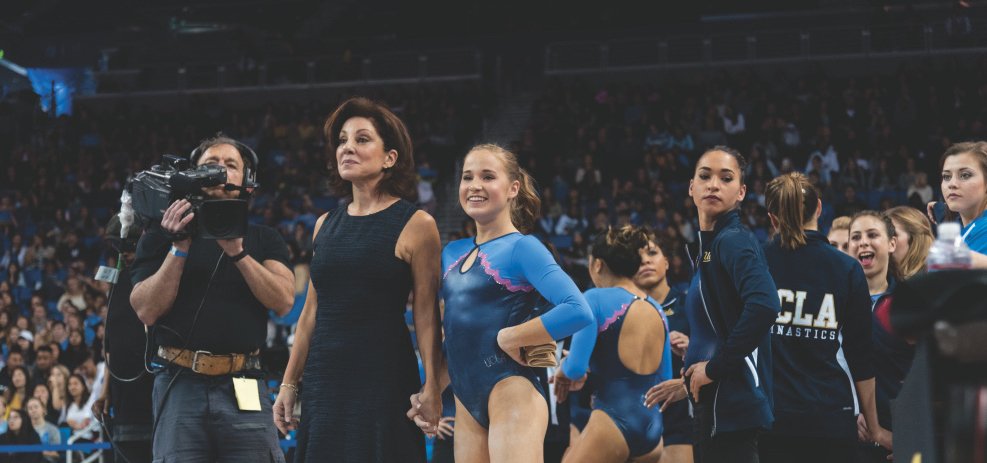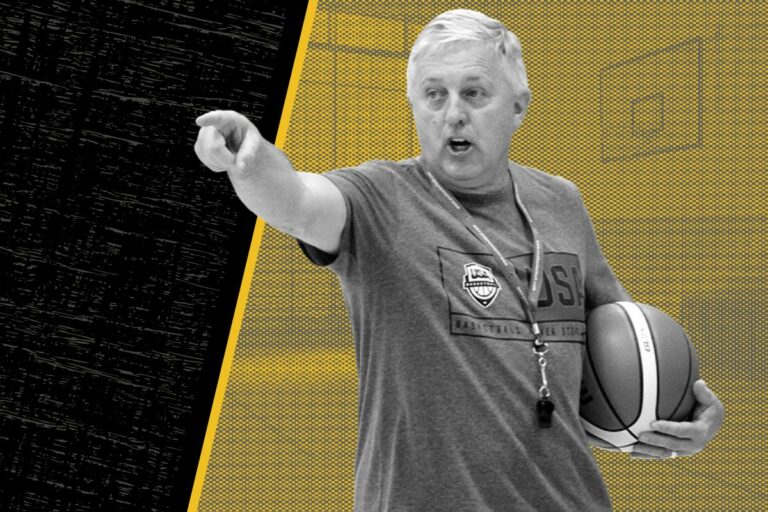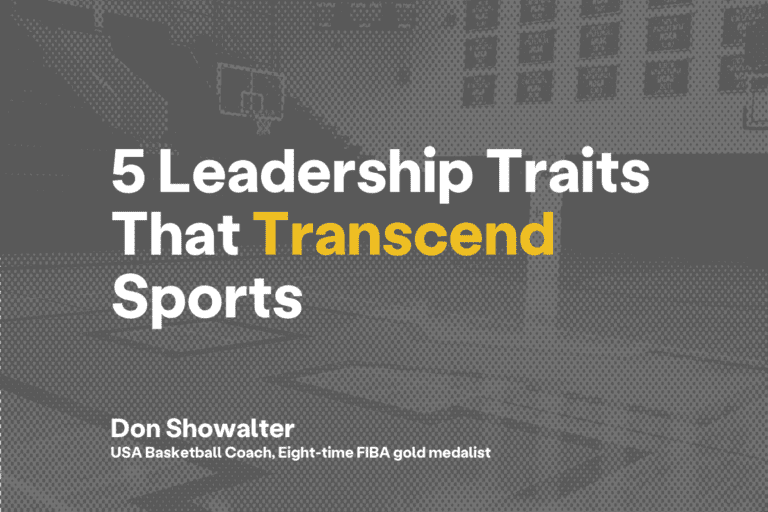Miss Val's Transformative Coaching Philosophy at UCLA
- Sports and other programs are powerful tools for teaching life lessons to young students.
- To stand out above the competition, it’s up to coaches and group leaders to properly prepare their clubs.
- Asking questions can help create warmer relationships between coaches and their clubs, as well as serve as teaching moments for both.
Valorie Kondos Field or “Miss Val” is regarded as one of the most accomplished gymnastics coaches of all-time. During her 28 year stretch as head coach of the UCLA Bruins women’s gymnastics team, Miss Val’s Bruins brought home 7 national championships and an amazing 18 PAC-12 championships.
Miss Val’s emphasis on the psychological and emotional aspects of coaching and enabling self-actualization among her athletes is one of the core principles of transformational coaching philosophy. This school of thought focuses on making long-term change by emphasizing beliefs, values, identity and purpose.
Leading Edge is excited to share her deep-rooted, transformative coaching philosophy, insight from her time with UCLA gymnastics, her close relationship with Coach John Wooden, and the important work she thinks is ahead for coaches, educators, and leaders.
This Q&A article has been adapted from Season 4, Episode 1 of The Snap! Raise Podcast. For more from the Miss Val interview (being mentored by Coach Wooden, becoming the coach she knew she could be, etc) listen to The Snap! Raise Podcast on your preferred podcast platform or via the player below.
Q: After retiring from your incredible coaching career at UCLA, you returned and taught a graduate course there, what was the course and why did you come back?
I was really excited when UCLA said, “Let’s have you teach a course on transformative coaching and let’s study the philosophies of coaches and leaders that have won.” I’m just so passionate about continuing the conversation of redefining success and “is all winning success?”
I feel like, in every venture in life, there’s a “win at all costs” culture that most of us have adhered to. We have done so much damage to our youth—mentally, emotionally, and physically, that comes from coaches and parents leaders that adhere to a win at all costs culture, and they’re not willing to accept the responsibility for the collateral damage that comes from it.
We studied Phil Jackson, Bobby Knight, Pat Summit, Belichick, Saban, and we studied me—we obviously studied Coach Wooden. It was so interesting to see the commonalities amongst all these coaches: attention to detail, unbelievable structure within their programs, unwavering commitment to their moral standards and to their foundation of their programs.
Now, my question that I posted [to] the students was okay, it wasn’t the principles they set forth. It was how they went about executing the principals. And that’s where you get the difference between someone who’s a yeller, a screamer, a chair thrower, or a choker like Bobby Knight, and someone who is more Zen like Phil Jackson. It was fascinating.
Q: Looking back at your coaching career, teaching the graduate course, and your personal experience, how do you define success?
I believe in what coach Wooden has said, “Success is peace of mind and knowing that you’ve done your best.”
Being able to go to bed at the end of the night, have some downtime, reassess my day: Was I honest? Was I hardworking? Was I considerate? Was I kind? Was I true to myself? Did I make excuses or not? And if I can check off the boxes that were positive, then I had a successful day. And if I can chalk up more successful days, looking back during the course of the year, then I’m having a successful year.
Coach Wooden’s definition of success is really what kicked me off into figuring out how I wanted to coach and why I was coaching. Through the years and through thinking about this over and over and over again, “What is success?” My definition of success as a coach and leader became so clear to me in my coaching.
I believe this sport is a masterclass in teaching really, really, really tough life lessons that you don’t learn in the classroom. And so, I was going to utilize the time that I have with our student athletes to develop these young women into champions in life who would then go out in the world and make the world a better place.
And if I did that well enough, then that champion mentality would transfer to [the] competition floor and we would win. And it did. And that has given me the platform to be able to go out and speak to this.
So the winning is what drives attention, but then I get to come through and give them a curve ball and say, I never focused on winning ever. I focused on developing superheroes through sport.
Q: If you're not "focused on winning," how does your transformative coaching philosophy help you cultivate the right tone and competitive drive as a leader?
I feel it comes through with the demeanor of the head coach because obviously. A lot of people will say that I was able to win because I had talent. Well, we all know that you don’t win just because you have talent.
I have always felt that we’re all basically doing the same stuff. We’re all doing the same amount of work. We’re all doing the same conditioning. All the teams, they’re all putting in the same hours and the same reps. It’s how that instruction is being disseminated to the student athletes.
Whenever you’re leading another human being—you’re parenting, coaching, teaching, leading—there is simply a difference: you can come about from dictating or you can come about it from motivating.
We’ve seen the coaches that coach from their ego and they’re dictators. And the athletes are robots. The athletes are a little commodities for their chess game. The coaches that are in it with their players are excited about it and bring about, “okay guys, listen today, we’re going to get 1% better. This is how we’re going to get 1% better. This is what it’s going to look like. We’re in this together and working together as a team.”
Motivating someone takes much longer than dictating and barking orders does. Just think about the times in your life that you’ve truly been motivated to make a change in something. That motivation is deep-rooted. You understand and you are embracing the reason why you want to do this. The effects from motivating change are long lasting versus dictating change to an athlete, which doesn’t last that long.
I can bark orders all day long and she’ll do it because I told her to. But, if I can explain to her how getting her legs straightened, pulling her feet is going to translate to her gymnastics skills, being easier and better and therefore, her score is going to be better. Then, she will have the motivation to want to do that on her own.
Q: The warmth and connections you build with your athletes is striking, how did you develop that transformative coaching philosophy?
I’ve always said one of the biggest things that helped me in my career—one of the biggest gifts—was I didn’t know anything. I didn’t know about gymnastics, but more importantly, I did not know how to develop a team culture. I didn’t grow up with that. So everything was new to me. And I say, it’s a gift because I had to ask a hundred questions a day. And, that became my standard of how I coached.
If I have an athlete up on beam and she did a beautiful beam routine, instead of just giving her a high five and moving off, I go, “Okay, come here. Educate me. What were you thinking before you went? What was your mindset? What was your mental choreography? How can I help you get that back when we would want to recall that?”
And, if they fall, if they make a mistake? Old school coaching is demeaning and degrading, which teaches the athlete that they have to formulate a judgment on themselves when they do poorly. That’s just total BS that needs to go away and never come back in our leadership of children. Because when an athlete makes a mistake, all you need to do is say, “Are you okay? Did you get hurt? No. Okay. So what were you telling yourself before you went? Let’s talk about what we could do next time to have a different result.”
It’s a teaching moment, right? And so the athletes that I coached never had fear of failure. They never worry that they’re going to get berated in a meet if they fell. Never assigning a judgment and making it personal.
Q: Your close relationship and mentorship with Coach John Wooden is well chronicled, what would you say was your most influential takeaway from Coach Wooden?
It’s a very simple answer but, when you think about it, it’s massively transformative. Being around him in so many different areas, either over at his house for dinner or taking him to speak in front of 10,000 people, whatever it was, Coach Wooden was always the same.
I knew coach Wooden’s philosophies. I knew his moral ethical code. I knew his character. But, he was also in the sport of athletics. He also won 10 championships in 12 years. You know, how do you do that maintaining this ethical moral code?
He was always kind, he was always humorous. He never, ever said a disparaging word about anyone. What you read and heard about him was who he was even in his personal private time.
That really resonated with me because you know, I grew up performing on stage. When I would drive into the parking lot to go to a gymnastics meet, I literally would sit in my car, take [a] deep breath and go, “Okay, showtime. Here we go.” And, I would turn on the lights and I would become this bigger than life version of me. And then after the event, after the meet, I’d get in the car, I come home, and I would just collapse.
And I was like, “Yeah, why do I do that? Why do I have to be two different people?” That’s what I started studying in Coach Wooden. I was like, “I can just be me. Just be normal. I don’t have to be way up here. Just be normal.”
Q: With everything you've learned and accomplished in coaching UCLA gymnastics, what thought do you want to leave with leaders of youth?
We are at a time now where we cannot ignore the psychological and emotional impact that we have as coaches. There is more reports of depression, anxiety, stress, and suicide amongst our youth than ever before. That’s on us. That’s on us coaches, on us parents, on leaders—anybody who sees oversees the development of a young person.
Coaching and teaching is a massive responsibility. It is a daunting, daunting responsibility. We all know athletes will listen to their coaches. Usually, not always but, we have more influence over the athletes whom we coach than a lot of people in their families.
And because of that, every single thing you say or you don’t say, or do or don’t do, they will translate it. The more you can communicate yourself to them, the less they’ll make up—because what people don’t know about you, they will make up. The last thing I want is one of my student athletes making up my truth, which is why I communicated so much to them.
If you pick up any leadership book outside of sport, they’re all going to tell you the same thing: They all talk about the importance of soft skills. The importance of learning. How to listen to your athletes, even if you don’t like what they’re saying. Listening is one of the best ways you can show respect for someone.
I believe the greatest coaches are brilliant strategists who love the game. Love the chess match of the game, but also see their players, not as pawns, but as whole human beings.
And when you fortify your athlete as a whole human being, that’s when the magic happens. That’s when, not just their athleticism kicks in, but that’s when they’re able to go into a competition, make a mistake, recover and not get Debbie downer. And be able to finish brilliantly.
So, I want to commend all of you for taking on this challenge of coaching. I want you to wake up and hit that refresh button all day long on the massive responsibility it is. And don’t feel that it is something that is heavy.
It is a gift that you have been chosen to help these young people develop into superheroes.
They’re going to go out and make the world a better place.
Miss Val’s commitment to being open with her athletes and taking the time to really get to know them beyond the sport is a prime example of transformative coaching philosophy, and it’s what helped her find so much success with UCLA gymnastics. To find out more about “Miss Val” you can visit her at The Official Miss Val











